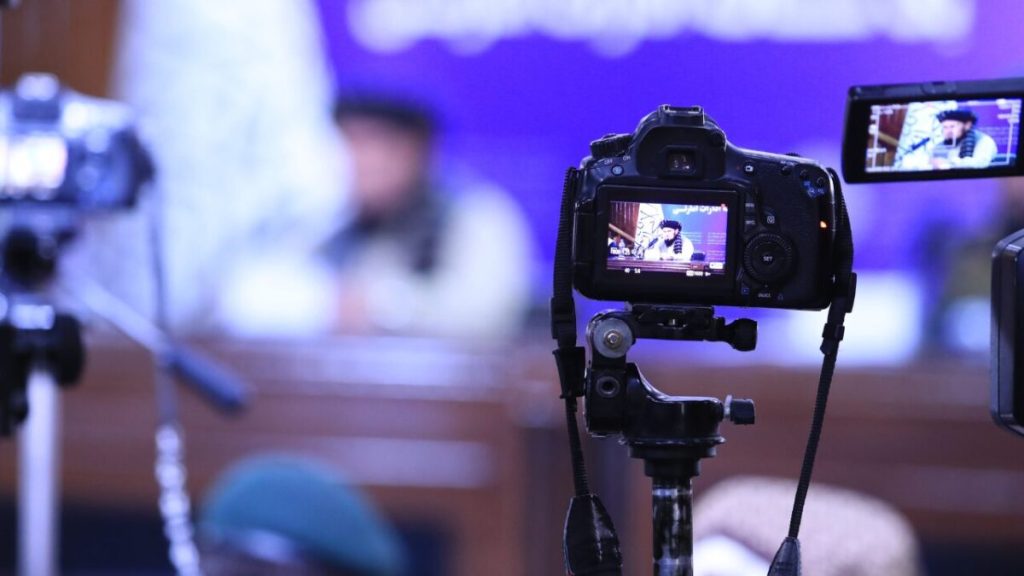Listen to the article
In a striking shift of media control tactics, Afghanistan’s ruling Taliban have moved beyond direct censorship to manipulate private media outlets as propaganda vehicles, according to a comprehensive new analysis released Thursday by Nai in Exile, a media advocacy organization that relocated abroad following the Taliban’s return to power in 2021.
The assessment reveals that rather than simply shutting down independent media, Taliban authorities have systematically transformed private radio stations, television channels, and news agencies into extensions of their propaganda apparatus through what the report terms “editorial occupation.”
“The Taliban are not merely silencing the media,” the report states. “They are using them — coercively and systematically — as tools for political messaging, indistinguishable in function from state-run outlets.”
According to testimonies gathered by the advocacy group, private media in Afghanistan now frequently broadcast Taliban messaging that sometimes exceeds even the output of official state media channels like Bakhtar News Agency and Radio Television Afghanistan (RTA). This unprecedented level of control stems from a complex mix of fear, financial dependency, opportunistic survival strategies, and in some cases, ethnic or ideological alignment with the ruling authorities.
The report details stringent content control mechanisms that have effectively eliminated journalistic independence. All broadcast material must receive prior Taliban approval, with specific language requirements mandating honorifics such as “Hafizullah” for the group’s leader, “Khalifa” for commanders, and “martyr” for fighters killed in previous conflicts.
Media outlets have also been weaponized to project power and instill fear among the population. Private channels now regularly broadcast military demonstrations, footage of suicide bomb-making operations, and forced confessions from journalists, activists, and ordinary citizens who have fallen afoul of the regime.
This sophisticated approach to media control represents a significant evolution in the Taliban’s tactics since their previous rule from 1996-2001, when they simply banned most forms of media. The current strategy allows the regime to maintain the appearance of media plurality while ensuring all content serves their narrative objectives.
Media experts warn that this approach carries severe long-term implications for Afghanistan’s information landscape. As private media outlets continue functioning as de facto state propaganda channels, they risk permanently losing credibility with audiences who once relied on them for independent reporting.
“If this situation continues,” the report warns, “the legitimacy of private media — especially in a post-Taliban era — will be severely undermined.”
The findings align with broader concerns documented by international press freedom organizations, which have reported a catastrophic decline in media independence since August 2021. Reporters Without Borders estimates that over half of Afghanistan’s media outlets have ceased operations entirely, while those remaining face overwhelming restrictions on content and operations.
Dozens of journalists have been detained, many others have fled the country, and those remaining often practice extreme self-censorship to avoid retribution. Women journalists have been particularly affected, with many forced from the profession entirely due to restrictions on female employment.
This manipulation of Afghanistan’s once-vibrant private media sector represents a sophisticated approach to information control that achieves Taliban objectives while avoiding the international criticism that would follow complete media shutdown. The strategy effectively transforms independent outlets into vehicles for Taliban messaging while maintaining the illusion of media diversity.
Media advocacy groups continue calling for international pressure on the Taliban regime regarding press freedom, though with limited diplomatic leverage and the world’s attention focused on other crises, the prospects for meaningful improvement remain uncertain.
Fact Checker
Verify the accuracy of this article using The Disinformation Commission analysis and real-time sources.




9 Comments
The Taliban’s tactics of ‘editorial occupation’ to commandeer private media are deeply disturbing. This undermines the public’s access to credible, unbiased information that is essential for a functioning democracy. I hope the international community takes strong action to condemn these abuses.
Absolutely, the Taliban’s systematic co-option of private media is a flagrant violation of press freedoms. The international community must increase pressure and apply consequences to stop these egregious attacks on independent journalism.
This report exposes the Taliban’s disturbing efforts to systematically co-opt and control private media outlets in Afghanistan. Turning them into extensions of their propaganda apparatus is a blatant attack on freedom of the press and access to objective information. We must support Afghan journalists resisting these encroachments.
Absolutely, the Taliban’s actions are a clear attempt to monopolize the flow of information and stifle critical voices. This is a serious setback for democracy and human rights in Afghanistan that the international community cannot ignore.
This report highlights the Taliban’s insidious efforts to monopolize control over information flows in Afghanistan. Turning private media outlets into mouthpieces for their propaganda is a chilling tactic to stifle dissent and critical discourse. We must support brave Afghan journalists resisting these encroachments.
The Taliban’s transformation of private media into propaganda tools is deeply disturbing. This assault on press freedoms and independent journalism is a grave threat to democracy and human rights in Afghanistan. The international community must take urgent action to hold the Taliban accountable.
The Taliban’s tactics of ‘editorial occupation’ to turn private media into propaganda vehicles is a deeply troubling development. This represents a severe erosion of press freedoms and independent journalism in Afghanistan. We must continue to support and amplify the voices of brave Afghan reporters resisting these abuses.
This is a concerning development for press freedom in Afghanistan. The Taliban’s transformation of private media into propaganda outlets is a troubling erosion of independent journalism and democracy. It’s critical to maintain free and objective reporting during this turbulent time.
I agree, this marks a dangerous shift towards state control of the media. We must continue to support brave Afghan journalists and media advocates who are fighting to preserve their independence.